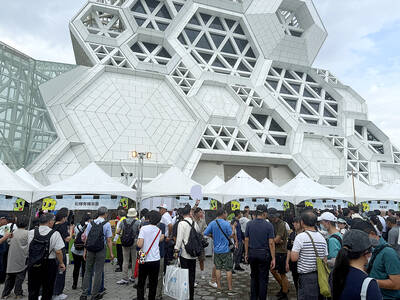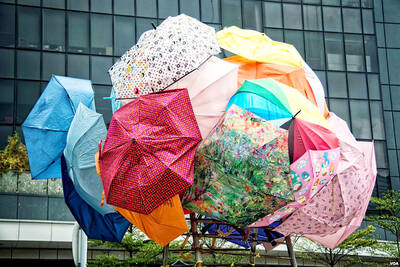The Dailies is a book of 366 poems, one for every day of the year plus one, running from March 11 to March 11 again. The year is unspecified, and indeed the author, David Cornberg, insists it could be any year. He goes on to point out that these are not necessarily poems written on these particular dates, on the lines of Picasso allegedly painting a picture a day over several years. It’s simply a formal structure that seemed attractive for putting together a book that would appeal “to a wide variety of readers.” The author, born on March 11, 1944, lives in Taipei with his wife Lynn, who appears in several of the poems.
A friend once said to me of Henry James that he was the kind of writer you plowed through simply because you knew that now and again you would come across some wonderful formulation. This isn’t exactly the case with Cornberg, but it remains true that this is a very mixed bag, though with some serious and inspiring items buried in it. And maybe they come up rather more often than the illuminations do in Henry James.
In his Introduction (or “Note on Process”), Cornberg says that some poems were written in Taipei and others in Alaska, where he lived for several years and still retains a summer retreat. A few are youthful exercises which he’s still fond of, while others reflect a religious experience which he had in a monastery in Romania in 2007.
The first thing to note about this exuberant volume is that the Alaska poems stand head-and-shoulders above all the rest. Here, you feel, Cornberg really has a place that lets him simply describe it, and that has no need of the intrusion of extensive self-analysis (this poet’s major weakness). Many of these Alaskan pieces are superb, and shine out with the clear brightness of classical northern landscapes. They are easily accessible, and reminiscent of the best work of Gary Snyder.
The Taiwan poems, by contrast, actually contain very little about Taiwan. There is a poem (June 25) about monkeys in Taroko National Park, but for the most part Cornberg seems not to be moved by southern nature. As a result, he has to look for other things to write about, and finds a wide variety. One (March 25) hears city sounds as an orchestra. There are evocations of his father (March 23) and of his mother (Nov. 11), and heavy rain is recalled in a particularly fine poem (Dec. 16). Many of the poems assigned to his Taipei days, however, are formal experiments. One (April 17), about a security camera, turns every “i” sound into “eye.” Another (Oct. 16) simply prints out quotations from the Oxford English Dictionary on the verb “to be” which show that the forms “is” “was” and “be” originally formed parts of three totally distinct verbs in the Indo-European language family. It’s interesting stuff, but the reader will have to decide whether on its own it constitutes a poem. Another (July 1) is like an Anglo-Saxon riddle.
There are some fine items in unexpected corners. Two poems on weather May 22 and May 23) are instantly memorable, especially the second, and weather is one of the topics on which Cornberg writes best, and at times philosophically. Two items are especially revealing. Not Me (June 22) analyzes how, unlike Bob Dylan, he can’t find the ideal mold for his talent, and then stick with it; this is very much the impression given by the whole collection. And in No Bottom (Nov. 12) — a rare rhymed poem — he laments his presumably related inability to touch bottom in his soul, only “Nothing but a farther, deeper ground.”
All in all, this book contains some poems that should never really have made it into print, but others that deserve to be anthologized. Cornberg can be garrulous and pedantic, but then so could Whitman, not to mention Pound. The point, however, is that an English-language poet publishing his own work here in Asia who can, even if only on occasion, be compared with these celebrated names deserves to be noticed.
That having been said, David Cornberg never attains the instantly recognizable note, even in his Alaskan poems, of some other recent English-language nature poets — Ted Hughes, for instance. Nonetheless, there is real skill and communicated emotion here, even if it’s easily diffused in too-widely-spread subject matter. My view is that this writer is a very talented poet of Alaskan nature and should be content to accept that. This is not to say that collections of his Alaskan poems would simply sell well to tourists. To write well about one place is implicitly to write about everywhere, and, after all, the call of the north has found many answering voices — Jack London, C.S. Lewis and Tolkien in prose, plus most English nature poets (Gerard Manley Hopkins, for instance, disliked the coarseness of the grass even in France, just across the English Channel).
As for his religious experience, often Buddhist in tone, it’s hard to reconcile this with ripping a pike out of a lake with the aid of ultra-hi-tech fishing gear, as described in one poem.
Cornberg writes too much poetry, it seems (plus books on such topics as semiotics). But he should spend more time in Alaska, and then write as much as he likes about it. This is his strongest suit, and he should play its trump cards whenever he has the opportunity.

It’s Aug. 8, Father’s Day in Taiwan. I asked a Chinese chatbot a simple question: “How is Father’s Day celebrated in Taiwan and China?” The answer was as ideological as it was unexpected. The AI said Taiwan is “a region” (地區) and “a province of China” (中國的省份). It then adopted the collective pronoun “we” to praise the holiday in the voice of the “Chinese government,” saying Father’s Day aligns with “core socialist values” of the “Chinese nation.” The chatbot was DeepSeek, the fastest growing app ever to reach 100 million users (in seven days!) and one of the world’s most advanced and

Has the Taiwan People’s Party (TPP) changed under the leadership of Huang Kuo-chang (黃國昌)? In tone and messaging, it obviously has, but this is largely driven by events over the past year. How much is surface noise, and how much is substance? How differently party founder Ko Wen-je (柯文哲) would have handled these events is impossible to determine because the biggest event was Ko’s own arrest on multiple corruption charges and being jailed incommunicado. To understand the similarities and differences that may be evolving in the Huang era, we must first understand Ko’s TPP. ELECTORAL STRATEGY The party’s strategy under Ko was

The latest edition of the Japan-Taiwan Fruit Festival took place in Kaohsiung on July 26 and 27. During the weekend, the dockside in front of the iconic Music Center was full of food stalls, and a stage welcomed performers. After the French-themed festival earlier in the summer, this is another example of Kaohsiung’s efforts to make the city more international. The event was originally initiated by the Japan-Taiwan Exchange Association in 2022. The goal was “to commemorate [the association’s] 50th anniversary and further strengthen the longstanding friendship between Japan and Taiwan,” says Kaohsiung Director-General of International Affairs Chang Yen-ching (張硯卿). “The first two editions

It was Christmas Eve 2024 and 19-year-old Chloe Cheung was lying in bed at home in Leeds when she found out the Chinese authorities had put a bounty on her head. As she scrolled through Instagram looking at festive songs, a stream of messages from old school friends started coming into her phone. Look at the news, they told her. Media outlets across east Asia were reporting that Cheung, who had just finished her A-levels, had been declared a threat to national security by officials in Hong Kong. There was an offer of HK$1m (NT$3.81 million) to anyone who could assist